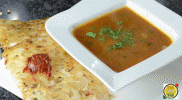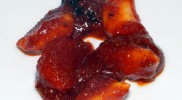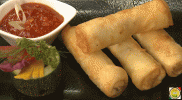This super quick stir fry tastes yummy, can be served as snack or an accomplishment with ...
A famous Hyderabadi dish, food prepared especially during Ramzan season. This is a slow-c...

A recipe of delicious Udupi style sambar or tiffin center style. This dish is made with ...

Garlic pickle has a very nice hot and sweet flavor. ...

Banana Peppers tastes amazingly delicious when stuffed with chicken and with the richness...

baby corn cigars is a crispy fried snack especially kids like this kind of food. Making a...
This is a south Indian chat recipe, made with potato, urad dal, besan flour, curd.
Dahi vada is a preferred Indian snack which are often made during the festive season. Dahi refers yogurt and vada is fried dumpling. They're lentil dumplings which are deep-fried are dunked in creamy yogurt after which topped with sweet chutney and spices. The terms dahi vada and dahi bhalle in many cases are used interchangeably all over the country.
Generally, dahi vadas are urad dal delicious balls that are smothered... Read More..
|
About Recipe
|
|||||||||||||||||||||||||||||||||||||||||||||||
|
|||||||||||||||||||||||||||||||||||||||||||||||
Dahi vada is a preferred Indian snack which are often made during the festive season. Dahi refers yogurt and vada is fried dumpling. They're lentil dumplings which are deep-fried are dunked in creamy yogurt after which topped with sweet chutney and spices. The terms dahi vada and dahi bhalle in many cases are used interchangeably all over the country.
Generally, dahi vadas are urad dal delicious balls that are smothered with creamy fresh curds and sprinkled with spices like chili powder, cumin powder, chaat masala or black salt and liberally doused having a tangy-sweet tamarind chutney. It's also known as Perugu garellu in Telugu and Thayir vada in Tamil and prepared on the very same type of soaking the black gram lentil vadas in well beaten curd plus a seasoning of mustard seeds, black gram dal, curry leaves, dry red chilies, asafetida (hing) is spread over it. Dahi Vada is utterly lip smacking snack and since you have a bite, the softness of the vada with yoghurt melt-in-the-mouth, delicious vada, it effects you'll an array of different tastes that tickle your taste buds, whetting your cravings for much more.
To maintain the deep-fried vadas soft you can first place them in water after which squeeze from the water and move it to thick beaten yogurt. For the best outcomes, the vadas need to soak for around an hour or two before serving. Sweeter dahi is chosen in some places of India, particularly in Maharashtra and Gujarat, even though the garnishing is still same. In Gujarat a mix of cilantro and tamarind chutneys are frequently used as garnish along with those mentioned previously. You may also mix cumin seeds, cut green chilies and cilantro leaves. Mix them to the beaten yoghurt. This would provide a good delicious taste to the yoghurt.
To make soft and fluffy vadas, use best quality dal and make batter by using very little water. Beat the batter properly to fermented and deep fry vada on medium hot oil. It's understandable that the lentils ground in the stone grinder provide the finest mixture for good vadas
Dahi Bhalla and Dahi Vada are type of alternatives to one another. The fundamental recipe is very similar, with a few small adjustments to the toppings included. Dahi vada is just - Vadas in yoghurt with a bit of chutneys and spices on the top. Lots of people also love to include a small amount of sugar in the yoghurt.


Pushpa Desai Posted on Mon Dec 29 2014
i just tried it. It turned out very well. Quick and easy. Thanks.?
Reply 0 - Replies
Sindhu Lakshmi Posted on Wed Feb 18 2015
ur recipes are simply superb . i love them. i tried most of your recipes.they are really awsome.?
Reply 0 - Replies

Vaibhav Igatpurikar Posted on Sat Oct 17 2015
hi Mam if you can pls also insert with this quantity how many approx vadas can we expect. so it will be easier to Men like us to guestimate.:) keep it up.?
Reply 0 - Replies
Shahida Rafique Posted on Fri Apr 08 2016
mouth watering recipesimply I love it thanks?
Reply 0 - Replies
 Easy recipes
Easy recipes
 Healthy Recipes
Healthy Recipes
 Dessert Recipes
Dessert Recipes
 Mutton and Lamb
Mutton and Lamb  Indian Bread Recipes
Indian Bread Recipes
 Dal Recipes
Dal Recipes
 Chutney and Pickles
Chutney and Pickles  Indo-Chinese Recipes
Indo-Chinese Recipes
 Snacks and Appetizers
Snacks and Appetizers
 Low Fat Recipes
Low Fat Recipes
 Chaat Recipes
Chaat Recipes
 Biryani and Rice
Biryani and Rice  Curry Recipes
Curry Recipes
 Indian Sweet Recipes
Indian Sweet Recipes
 Egg Recipes
Egg Recipes
 Paneer Recipes
Paneer Recipes
 Chicken Recipes
Chicken Recipes
 Indian tiffins
Indian tiffins
 Egg less Recipes
Egg less Recipes
 Soups and Salads
Soups and Salads
 Indian Sea Food
Indian Sea Food
 Manchurian Recipes
Manchurian Recipes
 Indian Drinks Recipes
Indian Drinks Recipes
 Dinner Recipes
Dinner Recipes
Mrs.Vahchef Posted on Wed Dec 03 2014
Reply 0 - Replies